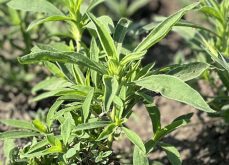At CropSphere in Saskatoon in January, Tom Wolf warned that dicamba can cause issues with sensitive crops — whether due to sprayer cleanout issues or from drift. We’d better be prepared to deal with it, since we’re going to be seeing it more often.
Monsanto’s Roundup Ready 2 Xtend soybeans are resistant to both glyphosate and dicamba. In early January Monsanto’s chief technology officer Robb Fraley spoke to the ag media on a conference call.
In 2017, Fraley told the media, these beans provided growers with “a 5.1 bushel per acre yield advantage compared to the competing Liberty Link system.”
Read Also

Manitoba crop insurance expands wildlife coverage, offers pilot programs
New crop insurance coverage is available to Manitoba farmers.
Fraley told the media that, in a grower survey, “97 per cent reported weed control satisfaction.”
Now, there is a third generation weed control package in Monsanto’s pipeline — these beans will also be tolerant to the Group 10 herbicie glufonsinate (Liberty). It’s currently in what Fraley refers to as Phase 4 of Monsanto’s research pipeline, close to the final phase, and should be available to U.S. farmers in the next two to three years. “Testing has been very strong for the product in terms of weed control and developing the herbicide formulations.”
Fraley pointed out that, while dicamba has been in the marketplace for close to 50 years, it’s generated few resistant weeds.
However, dicamba has generated some controversy recently. Successful Farming reports that, from the 2017 crop year, there are 2,708 cases of dicamba crop damage under investigation by U.S. state departments of agriculture. (Of course, not all of the 2,708 cases involve Monsanto products — there are other dicamba products on the market.) In the state of Arkansas, it will be illegal to spray dicamba from April 16 to October 31 in 2018.
Here in Western Canada, we need to get ready for even more dicamba — dicamba-resistant canola and sugar beets are on the way. Fraley said dicamba-tolerant canola is about five to six years from a commercial launch.
Encouraging farmers to use different modes of action, he says, is “the best way of ensuring resistance management for the future.”















